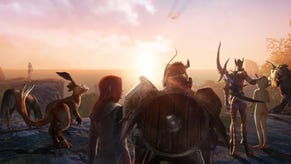Assassin's Creed Odyssey built without 'massive crunch'
“We think it's a false economy to burn out our teams. We risk losing them”
The sprawling wilderness of Ancient Greece in the latest Assassin's Creed was achieved without excessive working hours.
That's according to studio bosses at developer Ubisoft Quebec, who spoke to Gamasutra about how they managed to avoid overworking its staff while working on the best-selling open-world title.
"While we can always do better, I can tell you hand on heart that [Assassin's Creed Odyssey] hasn't required a massive crunch, like maybe some of the triple-As from five or ten years ago," the studio's MD Patrick Klaus told the site.
"We can still always do better, but we have managed pretty well to succeed in delivering a game of huge magnitude which is hitting a good quality [level], while making sure that our teams are not burnt out and disgusted with working in games.
"We collectively, on the management team, think that it is a false economy to burn out our teams. We risk losing them, or we risk disengaging them, and we will simply not get the best out of those talents if we're forcing them to work insane hours in crunch. We've got some way to go, but I'm feeling good about what we have achieved."
Assassin's Creed Odyssey won't be the only major AAA game this Q4 to have been developed without crunch, but the industry's working practices have come under scrutiny once again in light of the recent controversy surrounding Red Dead Redemption 2.
Rockstar's title has been in development for eight years, yet the the developer saw a backlash from the industry after Dan Houser commented that some employees had been working 100-hour weeks to get the game ready for its release tomorrow. He later clarified that this referred to a few members of the senior team, although reports from employees are decidedly mixed.
As with Red Dead, the three years of work behind Odyssey was spread across multiple studios - ten in total, including seven other Ubisoft teams, Sperasoft and Technicolor Games, with Quebec taking the lead.
Klaus and his colleagues - senior producer Marc-Alexis Côté and creative director Jon Dumont - acknowledge that there have been times where extra hours have been put into the project but stressed that this decision often comes from the team itself, and that those who work extra are encouraged to slow things down afterwards.
"They have a brilliant idea, they want to implement it, so they'll push for a couple of weeks and then rest a little bit," said Côté, later elaborating on what happens once a game is finished.
He said: "Before every person transfers to another project, they get the time to rest as well. This is really a studio-level initiative, so that people have some time to cool down.
"You become so involved in the work that you do creatively. You want people to be invested, but if you're just moved around from project to project this can also lead to creative burnout in a way, so we've found."
GamesIndustry.biz has been speaking to developers about how they prevent crunch at their studios, including some of our Best Places To Work 2018 winners. You can find a particularly comprehensive piece by Criterion's Matt Webster here.
Similarly, the topic has been discussed at various industry events recently, including this week's Game Connect Asia Pacific conference.








